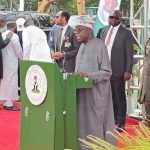The full implementation of Nigeria’s National Integrated Infrastructure Master Plan (2020–2043) will raise the country’s infrastructure stock from its current 35 percent of GDP to at least 70 percent by 2043.
This can be achieved through long-term partnerships that can help bridge the infrastructure gap with purpose and precision because neither plans nor policies alone can build roads or generate electricity.
ALSO READ: Tinubu woos global investment community to bridge $2.3trn infrastructure gap
President Bola Ahmed Tinubu stated this on Tuesday in his speech tagged, “The Future Is a Shared Responsibility”, at the 2025 Nigeria Public-Private Partnership Summit, organised by the Infrastructure Concession Regulatory Commission (ICRC), and held in Abuja.
“When we took charge over two years ago, we knew that a functional relationship between the public and private sectors would be the magic wand of transformation. That is what we have committed to, and that is what we are doing.
“We have strengthened the Infrastructure Concession Regulatory Commission and enhanced its capacity to regulate, superintend, and de-risk PPP transactions. We are determined to deliver infrastructure that is both sustainable and inclusive,” Tinubu stated.
The President who was represented at the event by Vice President Kashim Shettima said these goals require collective action.
Themed: “Unlocking Nigeria’s Potential: The Role of Public-Private Partnerships in Delivering the Renewed Hope Agenda,” the summit brought together top government functionaries and private sector leaders to discuss innovative infrastructure financing strategies.
The President underscored the critical role of PPPs in infrastructure development, affirming his administration’s unwavering commitment to collaborating with the private sector to deliver urgently needed infrastructure.
President Tinubu said, “The old model of public-only infrastructure funding is no longer sustainable. Our national aspirations far exceed what public budgets alone can deliver. That is why we must innovate and work together.
“We’re not looking for investors to carry burdens. We’re offering opportunities to create value. We seek long-term partners ready to help us bridge our infrastructure gap with purpose and precision”.
Stressing the need for private sector partners to go beyond capital provision, Tinubu stated, “Nigeria offers scale, demand, and returns like no other African market. But we need more than investment—we need innovation, efficiency, and integrity. I urge you to look beyond the risks and recognise the immense opportunity to shape a rising nation”.
The President pointed out that economic reforms implemented by his government have laid a stable foundation for transformation, saying, “From removing unsustainable subsidies, liberalizing the forex regime, to optimising government revenues, we have acted boldly and responsibly. We are streamlining bureaucratic bottlenecks, increasing transparency, and aligning our processes with global standards and investor expectations.”
He assured that “The projects that emerge from this summit must not gather dust. We will fast-track approvals, ensure inter-agency coordination, and prioritize swift execution. What matters to the average Nigerian is not promises, but power in their homes, roads to their farms, clean water, modern hospitals, and quality schools. We must build. We must deliver. And we must do it together.”
The Regional Director for Central Africa & Anglophone West Africa at the International Finance Corporation (IFC), Ms. Dahlia Khalifa, while speaking at the summit, reaffirmed the IFC’s support for Nigeria’s PPP initiative, and stated that the installation committed $5 billion to Nigeria in 2024 through investments and financing.
She cited key deals such as a $1.3 billion bond for IHS Towers and another $1.3 billion investment in Eleme Fertilizer, noting that such engagements will continue.
She said, “At IFC, we believe well-structured PPPs are more than financing tools—they’re catalysts for change. They unlock innovation, enhance efficiency, and improve public service delivery”.
According to her, successful PPPs depend on proper risk allocation and performance-based rewards and added:
“Done right, PPPs inject capital, upgrade infrastructure, and free up public funds for critical sectors like education and healthcare. Nigeria must continue to strengthen its regulatory and institutional framework to attract private capital”.
She lauded the ICRC’s efforts in updating PPP guidelines and publishing a transparent project pipeline on its website and urged the government to further reduce red tape, speed up timelines, and increase competition to improve overall project outcomes.
Ms. Dahlia Khalifa said, “Investors follow predictability. They invest where contracts are enforceable and disputes are resolved quickly and fairly. Nigeria must embed transparency, efficiency, and investor-friendly policies across the project cycle”.
Director-General/CEO of the ICRC, Dr. Jobson Oseodion, in his welcome address, reassured both local and international investors that Nigeria is open for business—and ready for robust partnerships.
The ICRC boss said, “With over 200 million people, a growing middle class, rich natural endowments, and an infrastructure gap of over $2.3 trillion, the case for PPPs in Nigeria is not just compelling — it is urgent”.
He added that the ICRC is committed to ensuring every PPP transaction is legally sound, economically viable, and socially impactful.
Dr. Oseodion said, “We align regulation with facilitation, and compliance with collaboration. The Commission stands ready to walk the journey with all partners—from project conceptualization to financial close and beyond”.
WATCH TOP VIDEOS FROM NIGERIAN TRIBUNE TV
- Let’s Talk About SELF-AWARENESS
- Is Your Confidence Mistaken for Pride? Let’s talk about it
- Is Etiquette About Perfection…Or Just Not Being Rude?
- Top Psychologist Reveal 3 Signs You’re Struggling With Imposter Syndrome
- Do You Pick Up Work-Related Calls at Midnight or Never? Let’s Talk About Boundaries







